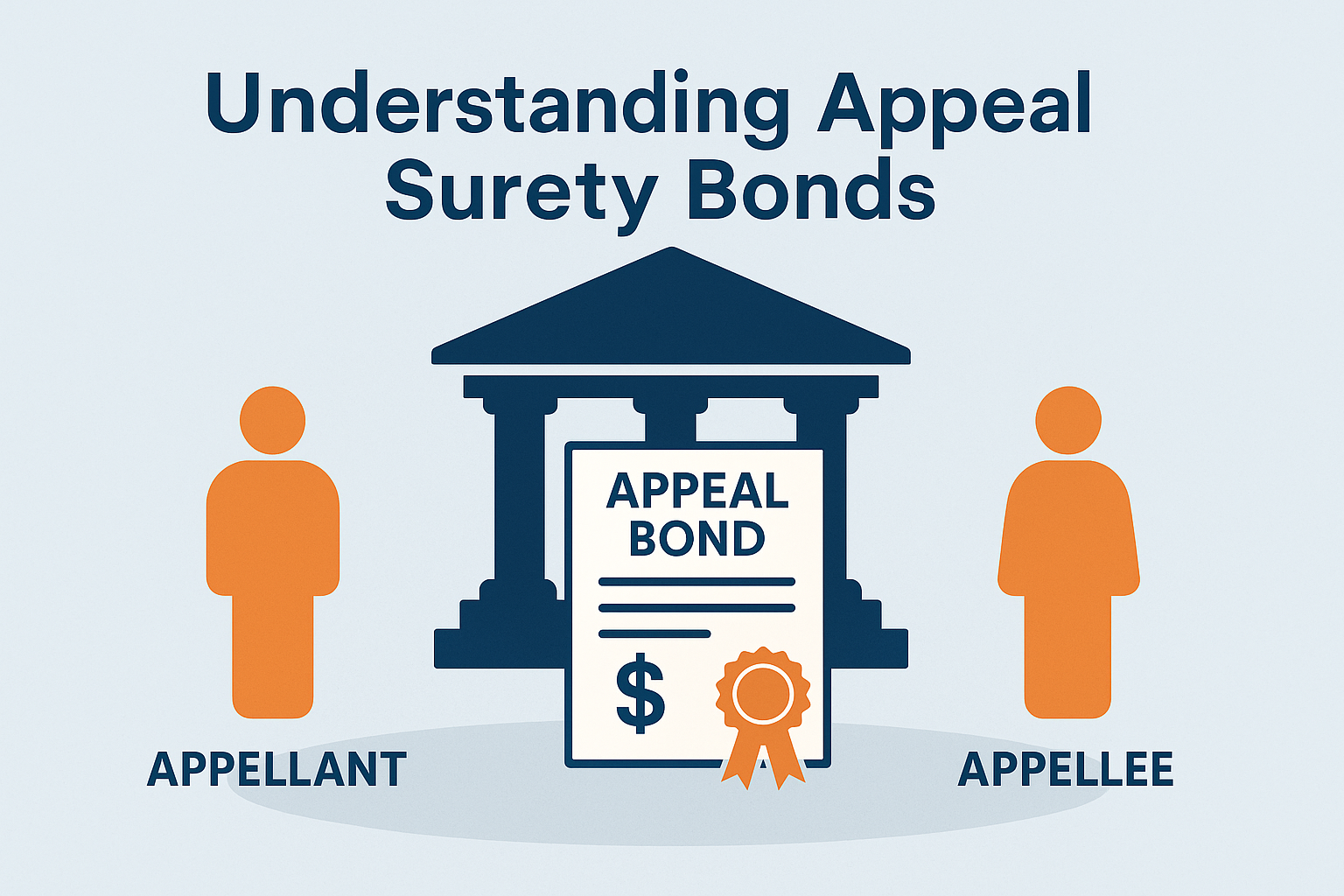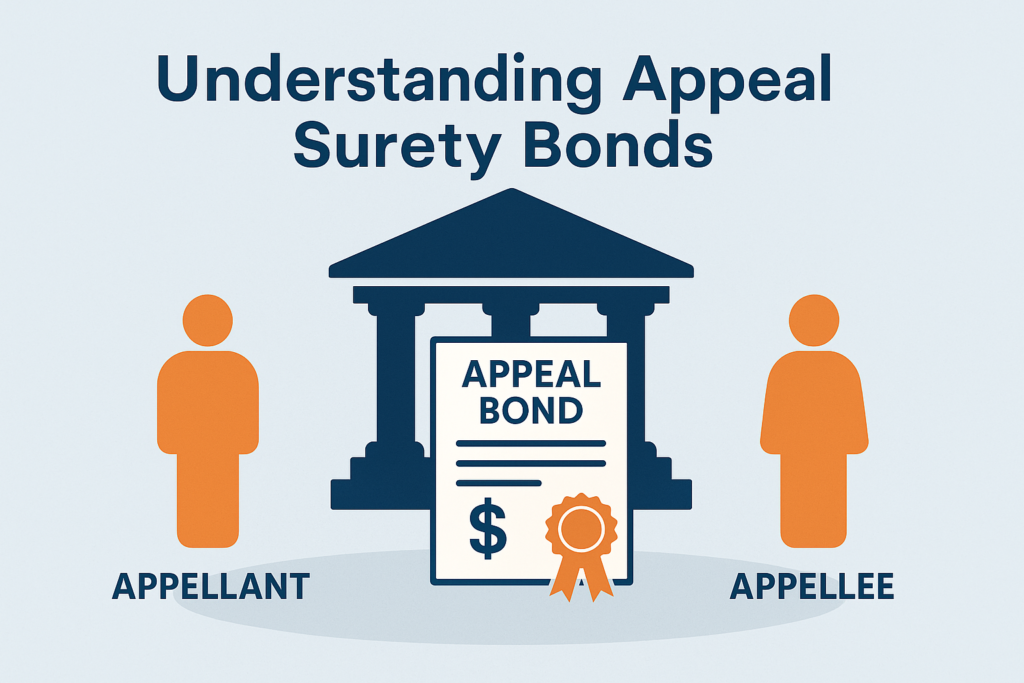Table of Contents
Understanding Appeal Surety Bonds
When a court renders a monetary judgment, the losing party, also known as the appellant, often seeks to reverse or modify the ruling by filing an appeal in a higher court. However, it’s critical to recognize that an appeal alone does not put an automatic hold on the original decision’s enforcement. Courts typically require the appellant to secure an appeal surety bond, sometimes referred to as a supersedeas bond, to officially stay the execution of the judgment while the case is reconsidered. The core function of this bond is to ensure that, if the appeal fails, the party who initially won in the trial court (the appellee or judgment creditor) will receive the sum awarded, including any applicable interest and costs, without further delay or dispute.
Essentially, the appeal surety bond serves as a financial safeguard for both sides. For appellants, it buys valuable time to prepare and present their argument without the immediate threat of asset forfeiture or collection actions. For appellees, it ensures they are not prejudiced by the delay inherent in the appellate process, as the bond stands as a guarantee that they will not need to duplicate litigation efforts to collect what a court has found they are owed. Given these crucial roles, it is vital for anyone involved in an appeal—whether directly or as counsel—to fully grasp when and why an appeal surety bond is required. For tailored advice, it’s wise to seek out comprehensive appeal surety bond guidance to comply with all legal and procedural standards, minimizing risk and maximizing the chances of a favorable outcome. Without this protective measure, the judgment creditor may pursue immediate collection, exposing the appellant to financial risk and potentially undermining the integrity of the appellate review process.
Determining the Bond Amount
The calculation of the required amount for an appeal surety bond is determined by the jurisdiction in which the judgment was issued and the unique characteristics of the underlying judgment. In general, courts mandate that the bond must be sufficient to cover the entire amount of the judgment, including any interest anticipated to accrue during the appeal, as well as any additional costs or penalties stipulated by law. Some states or federal courts apply statutory formulas, requiring the bond amount to be set at a percentage above the judgment, to safeguard against increased fees, inflation, or unforeseen expenses over the potentially lengthy appellate timeline.
For example, in California, state law sets the appeal bond at 150% of the original judgment, which is intended to ensure there is ample security for the appellee, even if the appeal takes months or years to resolve and interest accrues in the meantime. Other states have their own protocols, and it’s not uncommon for judges to exercise discretion based on the facts of the case or negotiations between the parties. Understanding these formulas can be challenging, so it is essential to refer to local court rules, consult the judgment itself for any special provisions, and, when in doubt, check authoritative resources such as California Appeal Bonds. These guides provide step-by-step instructions and jurisdiction-specific checklists to minimize the risk of miscalculating the required amount.
The Process of Securing an Appeal Bond
1. Financial Assessment
The first step in securing an appeal bond is a rigorous financial assessment conducted by the surety company. This evaluation is central to the underwriting process. The surety will carefully scrutinize the appellant’s creditworthiness, both at a corporate and personal level if necessary. Typical considerations include financial statements, tax filings, current and projected cash flow, and a thorough review of any outstanding debts and previous legal judgments. The more transparent and robust the applicant’s financial history, the quicker and smoother the review process usually is. In contrast, weak or unclear financial records may prompt requests for additional documentation, extending the timeline and increasing scrutiny.
2. Collateral Requirement
Surety companies frequently demand collateral to mitigate their risk exposure. Collateral acts as a financial backstop, ensuring the surety is not left at a loss if the appellant ultimately cannot pay the judgment. Common forms of collateral include cash deposits, letters of credit from reputable financial institutions, marketable securities, or real property. The process for evaluating real estate collateral, for example, can require appraisals, proof of ownership, title searches, and, in some instances, environmental reports. This step not only secures the surety’s interests but also gives the court additional confidence that the bond fully covers the liable amount throughout the appellate proceedings. Once the case is decided and all obligations are satisfied, the collateral is returned.
3. Application Submission
The formal application for an appeal bond requires attention to detail and completeness. Appellants must submit a comprehensive package, including a copy of the court’s judgment, the filed notice of appeal, personal or corporate financials, and sometimes explanations for any unusual items in the records. Omitting key documents or providing incomplete information can result in significant delays or even outright rejection. Many appellants choose to work closely with an experienced bond agent, who can facilitate communications between the applicant and the surety underwriter, ensuring nothing is overlooked and that all forms are properly filled out.
4. Approval and Issuance
Once the surety company finishes its evaluation and the necessary collateral is secured, the final approval is usually issued quite swiftly. The bond is then formally issued to the appellant and must be promptly filed with the appropriate court—often within a matter of days or within a timeframe set by the appellate calendar. Filing the bond on time is critical; missing a deadline can result in the loss of the right to stay enforcement, allowing the judgment creditor to seize assets even as the appeal moves forward.
Potential Challenges and Considerations
Even though the steps involved in obtaining appeal surety bonds are conceptually straightforward, practical complications often arise that can prolong the process or create unanticipated obstacles for appellants. One of the most significant of these is the challenge of providing suitable collateral. Real property is a common choice, but verifying a clear title, appraising the asset, and completing required legal documentation can consume valuable days or weeks—creating risk if tight deadlines are looming. Additionally, some forms of collateral, like certain stocks or business interests, can fluctuate in value, necessitating constant monitoring or reassessment by the surety.
- Collateral Delays: Establishing acceptable collateral, particularly real estate or other illiquid assets, can be hindered by time-consuming appraisals, legal checks, and environmental reviews. These steps, while sometimes unavoidable, should be anticipated early in the process to avoid jeopardizing filing deadlines or putting the appellant’s legal strategy at risk.
- Financial Scrutiny: The surety’s review process is comprehensive, and those with international assets, recent bankruptcies, or litigation exposure may face additional barriers. In complicated cases, sureties might demand substantial extra collateral, require higher premiums, or even deny issuance altogether if the perceived risk is too great.
- Jurisdictional Variations: Requirements for appeal bonds differ greatly between state and federal courts, and sometimes even among counties or districts within a state. For example, some jurisdictions may require affidavits of good faith, specific forms, or special notices to be filed alongside the bond. Legal counsel should always verify requirements with the relevant court, referencing in-depth resources such as this guide to appeal bond exposure to spot potential pitfalls early in the process.
Conclusion
Appeal surety bonds serve an indispensable role in maintaining fairness throughout the appellate process. By requiring appellants to provide a financial guarantee, these bonds ensure that court-awarded judgments are protected, even as cases proceed through higher courts. Legal professionals, parties to litigation, and insurance agents must all be proactive, well-informed, and responsive to the nuances of bond issuance to safeguard their interests. Understanding the procedural and jurisdictional requirements and acting promptly to secure the necessary bond are crucial steps for any appellant seeking to preserve their right to appeal without risking untimely enforcement of a monetary judgment. With proper preparation and experienced guidance, navigating the appeal surety bond process becomes a manageable and secure aspect of high-stakes litigation. By doing so, both appellants and appellees can have confidence that their interests will be protected until the appellate process has run its full course, making the surety bond a cornerstone of justice and due process in civil litigation.





